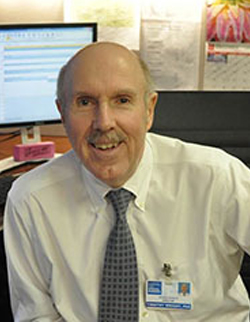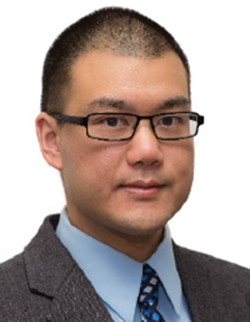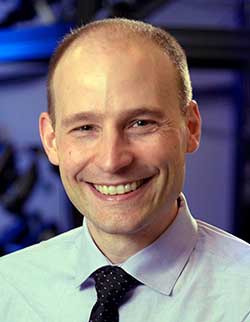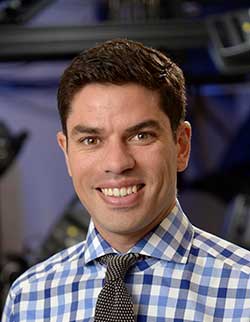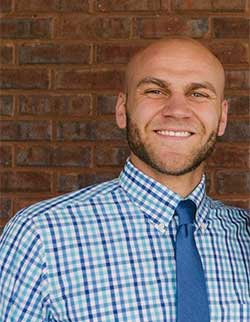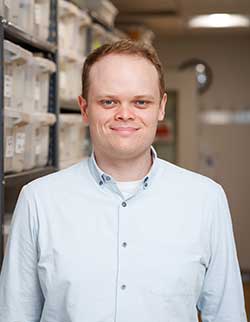Biomechanics Staff
Senior Staff
Post Doctoral Fellow
Jonathan Glenday, PhD
Post Doctoral Fellow
Department of Biomechanics
AMT Center
510 East 73rd Street, Room 202
New York, NY 10021
Tel: 646.797.8532
Email: GlendayJ@hss.edu
About Jonathan Glenday
Jonathan Glenday joined Hospital for Special Surgery in March 2020 as a Postdoctoral Fellow to work in collaboration with the Adult Reconstruction and Joint Replacement Service. His research aims to improve implant longevity by understanding how total knee arthroplasty (TKA) surgical choices effect bone-implant interaction. Alongside his team members in the Department of Biomechanics, he has developed a computational workflow that connects musculoskeletal models with finite element models to quantify the effect of component alignment and design on the stability and fixation of TKA.
Jonathan obtained both his undergraduate degree in Electromechanical Engineering and his doctoral degree in Biomedical Engineering from the University of Cape Town in South Africa. His doctoral research, which was conducted in collaboration with the Motion Analysis Laboratory at Hospital for Special Surgery, utilized computational modelling to optimize prosthesis alignment for reverse total shoulder arthroplasty. Jonathan completed his doctoral degree in 2018 and, in 2019, he worked as a Postdoctoral Researcher at the University of Tübingen in Germany. During his time there, he developed a musculoskeletal model of the wrist to assess the risk factors associated with carpal tunnel syndrome.
Education
2014 – 2018: PhD in Biomedical Engineering – University of Cape Town, South Africa.
2010 – 2013: BSc(Eng) in Electromechanical Engineering - University of Cape Town, South Africa.
Awards
2020: Best presentation in computational modeling for arthroplasty – 1st ISTA New Early-career Webinar Series.
2018: Best shoulder presentation – 64th South African Orthopaedic Congress.
Selected Publications
Dey, R., Glenday, J., du Plessis, J., Sivarasu, S., and Roche, S. (2023). Characterising moment arms of the coracobrachialis and short head of biceps for healthy and reverse total shoulder arthroplasty during elevation and rotation: a modelling study. Journal of Shoulder and Elbow Surgery. DOI: https://doi.org/10.1016/j.jse.2023.01.015.
Glenday, J., Kontaxis, A., Roche, S., and Sivarasu, S. (2021). Development of a framework to assess the biomechanical impact of reverse shoulder arthroplasty placement modifications. Journal of Orthopaedic Research. DOI: https://doi.org/10.1002/jor.25238.
Glenday, J., Wright, T., Lipman, J., Sculco, P., Mayman, D., Vigdorchik, J., and Quevedo-Gonzalez, F. (2021). Effect of varus alignment on the bone-implant interaction of a cementless tibial baseplate during gait. Journal of Orthopaedic Research. DOI: https://doi.org/10.1002/jor.25129.
Glenday, J., Steinhilber B., Jung F., and Haeufle, D.F.B. (2020). Development of a musculoskeletal model of the wrist to predict frictional work dissipated due to tendon gliding resistance in the carpal tunnel. Computer Methods in Biomechanics and Biomedical Engineering. DOI: https://doi.org/10.1080/10255842.2020.1862094.
Glenday, J., Kontaxis, A., Roche, S., and Sivarasu, S. (2019). Effect of humeral tray placement on impingement-free range of motion and muscle moment arms in reverse shoulder arthroplasty. Clinical Biomechanics. 62, 136-143. DOI: https://doi.org/10.1016/j.clinbiomech.2019.02.002.
For more publications, please see the PubMed listing.
Selected Presentations
Glenday, J., Sculco, P., Vigdorchik, J., Lipman, J., Kahlenberg, C., Mayman, D., Wright, T., and Quevedo-Gonzalez, F. Tibial baseplate motion relates to tibiofemoral kinematics during gait: a holistic evaluation of TKA biomechanics using a patient-specific computational workflow. 33rd International Society for Technology in Arthroplasty Congress. (09/2022).
Glenday, J., Sculco, P., Vigdorchik, J., Lipman, J., Wright, T., and Quevedo-Gonzalez, F. The initial fixation of cementless total knee arthroplasty is associated with the anterior-posterior translation during gait: a computational study. 2022 Annual Meeting of the American Academy of Orthopaedic Surgeons. (03/2022).
Glenday, J., Wright, T., Lipman, J. Sculco, P., Mayman, D., Vigdorchik, J., and Quevedo-Gonzalez, F. Effect of varus alignment on the bone-implant interaction of cementless tibial baseplates. 1st New Early-career Webinar Series – International Society for Technology in Arthroplasty. (11/2020).
Glenday, J., Kontaxis, A., Roche, S., and Sivarasu, S. Optimisation of reverse shoulder arthroplasty through the combination of prosthesis placement modifications. XXVII Congress of the International Society of Biomechanics. (08/2019).
Reza Pourmodheji, PhD
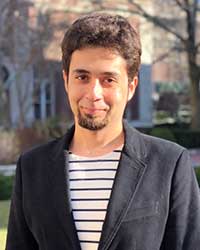
Post Doctoral Fellow
Department of Biomechanics
AMT Center
510 East 73rd Street, Room 202-A
New York, NY 10021
Tel: 212.774.7275
Email: pourmodhejir@hss.edu
About Reza Pourmodheji
Reza joined the Biomechanics Department at HSS in February 2022. The focus of his research is knee biomechanics where he integrates robotic experimental tools and physics-based computational approaches from cadaveric and patient-specific measurements to answer the research questions for orthopedic care improvement. He works closely with Adult Reconstruction and Joint Replacement, Sport Medicine and Radiology and Imaging Services at HSS.
Reza obtained his PhD in Mechanical Engineering from the City University of New York where he currently serves as Adjunct Assistant Professor lecturing mechanical engineering courses. Prior to HSS, he was research associate at Michigan State University working on mathematical modeling and mechanobiology in progression of cardiovascular diseases.
Appointments
Postdoctoral Fellow, Department of Biomechanics, Hospital for Special Surgery
Adjunct Assistant Professor, The City University of New York
Education
Ph.D. – Mechanical Engineering, The City University of New York, New York, NY – 2018
M.Sc. – Mechanical Engineering, Isfahan University of Technology, Isfahan, Iran – 2012
B.Sc. – Mechanical Engineering, Isfahan University of Technology, Isfahan, Iran – 2008
Awards
NIH Travel Award, IMAG-MSM 2020, Bethesda, MD
Arthur Goldstein Award for outstanding teach in Mechanical Engineering, The City University of New York, 2019
Emma Reznick, PhD
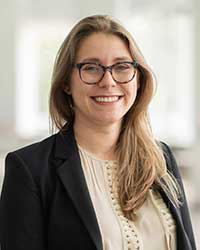
Post Doctoral Fellow
Department of Biomechanics
AMT Center
510 East 73rd Street, Room 202-A
New York, NY 10021
About Emma Reznick
Emma Reznick joined the Biomechanics Department at HSS in 2023. Her current research focuses on how knee laxity, ligament properties, and bony morphology contribute to knee biomechanics and the risk of ACL injury. Through individualized, physics-based computational models, she is working to develop personalized avenues of care. She collaborates with the Sports and Arthroplasty services at HSS.
Emma received a PhD and MS in Robotics from the University of Michigan (2023) as well as a MS in Biomedical Engineering from the University of Texas at Dallas (2020). Her graduate research focused on the personalization of gait models for powered prosthetic users, and developing interfaces that allow for clinical implementation and individualization of these models.
Education
PhD – Robotics – University of Michigan, 2023
MS – Robotics – University of Michigan, 2023
MS – Biomedical Engineering – University of Texas at Dallas, 2020
BS – ACS Biochemistry – Colorado College, 2016
Aarti Shenoy, PhD
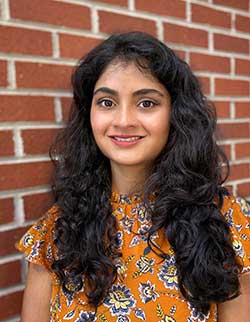
Post Doctoral Fellow
Department of Biomechanics
AMT Center
510 East 73rd Street, Room 202-A
New York, NY 10021
Tel: 646.714.6431
Email: shenoya@hss.edu
About Aarti Shenoy
Dr. Aarti Shenoy joined the Biomechanics department at HSS as a Postdoctoral Fellow in February 2021. Dr. Shenoy is interested in implant and modular junction corrosion and its impact on implant longevity. She has investigated corrosion behavior in hip implants, particularly modular dual mobility designs, using in vitro test methods and retrieval analysis studies in collaboration with the Arthroplasty service. Her research will continue to focus on material science aspects within orthopedic devices: structure-property-processing interactions and their effects on clinical outcomes. Dr. Shenoy is interested in biomedical alloys, their microstructures and how alloy microstructure might affect mechanical properties of the material and the device as well as device performance.
Dr. Shenoy received her PhD in Bioengineering from Clemson University as part of Dr. Jeremy Gilbert’s research group. Her research was focused on test method development to evaluate hip implant mechanical and electrochemical performance, retrieval analysis using microscopy techniques, and studying macrophage-tribocorrosion interactions in vitro. She was a technology transfer and commercialization intern at the Clemson University Research Foundation (CURF) where she acted as a liaison between faculty members developing IP and the tech transfer team, and also developed marketing materials for existing Clemson IP.
Dr. Shenoy also holds a Bachelor of Engineering in Biomedical Engineering from University of Mumbai, India and a Master of Science in Bioengineering from Syracuse University, NY
Awards
New Investigator Recognition Award (NIRA) finalist, 2023
Selected Publications
- C. Kahlenberg, E. Baral, A.A. Shenoy, “Clinical and Biomechanical Characteristics of Posterior-Stabilized Polyethylene Post Fractures in Total Knee Arthroplasty: A Retrieval Analysis”, Journal of Arthroplasty, Feb 2023
- A.A. Shenoy, S.M. Kurtz, J.L. Gilbert, “Non-Tribological Corrosion Modes Dominate Wrought CoCrMo Acetabular Taper Corrosion: A Retrieval Study”, Journal of Biomedical Materials Research Part-B, May 2021 (DOI: 10.1002/jbm.b.34854)
- M. Wiegand, A.A. Shenoy et al., “Sensing Localized Surface Corrosion Damage of CoCrMo Alloys and Modular Tapers of Total Hip Retrievals Using Nearfield Electrochemical Impedance Spectroscopy”, ACS Biomaterials Science and Engineering, Jan 2020 (DOI: 10.1021/acsbiomaterials.9b00945)
- A.A. Shenoy, J.L. Gilbert, “In vitro test methods for seating and fretting corrosion behavior of modular metal-on-metal acetabular tapers”, Journal of Orthopaedic Research, Dec 2019 (DOI: 10.1002/jor.24554)
- E.S. Ouellette, A.A. Shenoy (co-first-author), J.L. Gilbert, “The seating mechanics of head-neck modular tapers in vitro: Load-displacement measurements, moisture, and rate effects”, Journal of Orthopaedic Research, Sept 2018 (DOI: 10.1002/jor.23725)
For more publications, please see the PubMed listing.
Selected Presentations
- A.A. Shenoy, A. Pekmezian, T. Wright, D.E. Padgett, “Corrosion in Modular Dual Mobility Acetabular Components: A Retrieval Analysis Study”, Orthopaedic Research Society Annual Meeting 2023, Dallas TX, USA (Finalist for New Investigator Recognition Award)
- A.A. Shenoy, J. Steele, D.E. Padgett, T.M. Wright, “How do surface finish and taper design influence corrosion modes and mechanically assisted crevice corrosion behavior in modular dual mobility acetabular tapers?”, International Society for Technology in Arthroplasty Annual Meeting 2022, Maui HI, USA (Talk)
- A.A. Shenoy, C Kahlenberg, et al., “Post Fractures in Total Knee Arthroplasty: Differences in Fracture Progression between UHMWPE and XLPE Posts”, International Society for Technology in Arthroplasty Annual Meeting 2022, Maui HI, USA (Talk)
- A.A. Shenoy, J.L. Gilbert, “In Vivo Corrosion of Acetabular Modular Tapers Reduces Local Corrosion Resistance: Near-field Electrochemical Impedance Spectroscopy as an Indicator of the Type and Severity of Corrosion in Retrieved Hip Implants”, Exciting Research in Orthopaedic Implants and How to Get it Funded, Orthopaedic Research Society Implants RIG Section Virtual Session, 2021, (Early-stage career investigators invited talk)
- A.A. Shenoy, J.L. Gilbert, “Near-Field Electrochemical Impedance Spectroscopy Methods for Retrieval Surface Analysis”, International Society for Technology in Arthroplasty Annual Meeting 2019, Toronto, Canada (Talk)
- A.A. Shenoy, S.M. Kurtz, J.L. Gilbert, “Biological, Chemical and Mechanical Damage Modes in Corrosion of CoCrMo Acetabular Liners”, International Society for Technology in Arthroplasty Annual Meeting 2018, London, UK (Young Investigators Session, Talk)
- J.L. Gilbert, A.A. Shenoy, “Bio-metallurgical interactions during in vivo corrosion: Beyond fretting corrosion, a study of the forms of corrosion in retrieved modular implants, their causes and consequences”, ASTM Symposium 2017, Toronto, Canada
Research Staff
Erin Berube, MS

Post-Bac Researcher
Department of Biomechanics
AMT Center
510 East 73rd Street, Room 202-A
New York, NY 10021
Tel: 212.606.1737
Email: BerubeE@hss.edu
About Erin Berube
Erin Berube joined the Biomechanics Department at HSS in 2019 after graduating with a B.S. in Biomedical Engineering and an M.S. in Biology from Rensselaer Polytechnic Institute. She became interested in orthopedic research while working in Deva Chan’s lab studying models of ACL injury. Erin joined HSS to transition from basic science research to clinical and translational research. She works in collaboration with the Sports and Arthroplasty services to understand knee joint stability.
Her current research focuses on understanding how knee laxity, bony morphology, and quantitative MRI measurements relate to risk of ACL injury and ACL graft healing. The goal of this work is to reduce rates of early graft failure following ACL reconstruction.
She has also studied the effects of surgical decision making on knee laxity and stability in total knee arthroplasty (TKA). This work aims to understand how implant selection affects knee laxity and patient satisfaction following TKA.
Selected Publications
- Kent RN 3rd, Amirtharaj MJ, Berube EE, Imhauser CW, Thein R, Voleti PB, Wickiewicz TL, Pearle AD, Nawabi DH. Anterior cruciate ligament graft forces are sensitive to fixation angle and tunnel position within the native femoral footprint during passive flexion. Knee. 2021 Dec;33:266-274. doi: 10.1016/j.knee.2021.08.003. Epub 2021 Nov 26. PMID: 34844133.
- Shamritsky DZ, Berube EE, Sapountzis N, Diaz A, Krell EC, Wright TM, Parides M, Westrich GH, Mayman DJ, Sculco PK, Chalmers BP, Imhauser CW. Novel Arthrometer For Quantifying In Vivo Knee Laxity in Three Planes Following Total Knee Arthroplasty. J Arthroplasty. 2023 Feb 20:S0883-5403(23)00138-9. doi: 10.1016/j.arth.2023.02.030. Epub ahead of print. PMID: 36813213.
- Razu S, Jahandar H, Zhu A, Berube E, Manzi J, Pearle A, Nawabi D, Wickiewicz TL, Santner T, Imhauser C. Bayesian Calibration of Computational Knee Models to Estimate Subject-Specific Ligament Properties, Tibiofemoral Kinematics, and Anterior Cruciate Ligament Force with Uncertainty Quantification. J Biomech Eng. 2023 Feb 24:1-35. doi: 10.1115/1.4056968. Epub ahead of print. PMID: 36826392
For more publications, please see the PubMed listing.
Kalle Chastain, MS
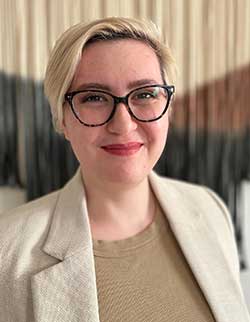
Research Engineer, Biomechanics
Department of Biomechanics
AMT Center
510 East 73rd Street, Room 202
New York, NY 10021
Tel: 646.714.6203
Email: chastaink@hss.edu
About Kalle Chastain
Kalle grew up near Seattle, Washington where she received her B.S. in Mechanical Engineering at University of Washington in 2018. While at UW, she worked at the Center for Limb Loss and Mobility with Dr. William Ledoux as an undergraduate assistant. She made her way to the Center for Applied Biomechanics at the University of Virginia working with Dr. Jason Kerrigan. During her graduate work, she assisted on projects regarding automotive injury research, with an emphasis on reclined occupants of highly automated vehicles. Her thesis, Characterization of the Mechanical Response of the Lumbar Spine: The Effect of a Compressive Axial Load, focused on characterizing the human lumbar spine for the purpose assessing the fidelity of human body models in motor vehicle crashes. After graduating with her M.S. in Mechanical and Aerospace Engineering in 2021, she found HSS and was hired as a Research Engineer in the Biomechanics department, under Dr. Suzanne Maher.
Kalle’s work is primarily in experimental and robotic work, focusing on contact mechanics of the knee joint. Kalle’s current projects include researching the change in contact mechanics following a partial meniscectomy, and the change in contact mechanics following a tibial osteotomy to realign the tibial plateau. She has previously worked on investigations of contact mechanical changes following a meniscal leaflet tear, and meniscal root tear. She is a member of the Orthopedic Research Society (ORS) and recently attended her first in-person ORS conference.
Education
- Master’s of Science in Mechanical and Aerospace Engineering, 2021; University of Virginia, Charlottesville, VA
- Bachelor’s of Science in Mechanical Engineering, 2018; University of Washington, Seattle, WA
Awards
Best Poster in Meniscus Section, Orthopedic Research Society (ORS) Conference, 2023
Selected Publications
- Chastain, K., Wach, A., Pekmezian, A., Wimmer, M. A., Warren, R. F., Torzilli, P. A., ... & Maher, S. A. (2022). ACL transection results in a posterior shift and increased velocity of contact on the medial tibial plateau. Journal of Biomechanics, 144, 111335.
- Richardson, R., Jayathirtha, M., Chastain, K., Donlon, J. P., Forman, J., Gepner, B., ... & Kerrigan, J. (2020). Thoracolumbar spine kinematics and injuries in frontal impacts with reclined occupants. Traffic injury prevention, 21(sup1), S66-S71.
Jeffrey Hoffman, MS
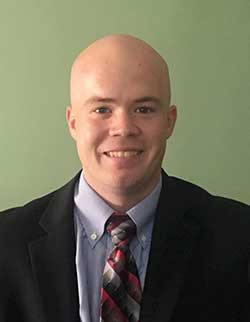
Research Engineer
Department of Biomechanics
AMT Center
510 East 73rd Street, Room 202
New York, NY 10021
Tel: 212.774.2995
Email: hoffmanj@hss.edu
About Jeff Hoffman
Jeff Hoffman began at HSS as a research engineer in the biomechanics department in March 2019. As a research engineer, he leads testing exploring the biomechanics of the foot and ankle using a validated 6-degree of freedom robotic gait simulator. Currently, he is examining the effect of surgical interventions on a validated model of progressive collapsing foot deformity during walking. Additionally, he is working with clinical staff to evaluate the effect of tibial implant design on early stage micromotion after total ankle arthroplasty. Previously, Jeff has worked on biomechanical projects aimed at addressing common pathologies of the foot and ankle, such as Jones’ fracture and Lisfranc injuries.
In addition to foot and ankle work, Jeff is involved in uniaxial mechanical testing for various projects around the lab.
Prior to HSS, Jeff received his M.S. in Biomedical Engineering from Drexel University in 2018. During his time at Drexel, he worked in collaboration with the motion laboratory at Shriners Hospital for Children in Philadelphia to evaluate the changes in pediatric spinal motion with age in healthy and scoliotic patients. Jeff received a BS in Biomedical Engineering from the University of Delaware in 2016. During his time at UD, Jeff worked as an undergraduate research assistant to evaluate the effect of functional electrical stimulation during gait in pediatric patients with cerebral palsy.
Education
BS – University of Delaware, 2016
MS – Drexel University, 2018
Awards
J Leonard Goldner Award, AOFAS Annual Meeting, 2022
Selected Publications
- Hoffman JW, Bitar RC, Williams N, Steineman BD, Sturnick DR, Garrison GW, Demetracopoulos CA, Drakos MC, O'Malley MJ. Orthosis and Foot Structure Affect the Fifth Metatarsal Principal Strains During Simulated Level Walking. Am J Sports Med. 2022 May;50(6):1659-1667. doi: 10.1177/03635465221079652. Epub 2022 Mar 18. PMID: 35302902.
- Kim J, Hoffman J, Steineman B, Eble SK, Roberts LE, Ellis SJ, Drakos MC. Kinematic Analysis of Sequential Partial-Midfoot Arthrodesis in Simulated Gait Cadaver Model. Foot Ankle Int. 2022 Dec;43(12):1587-1594. doi: 10.1177/10711007221125226. Epub 2022 Oct 14. PMID: 36239404.
- Henry JK, Hoffman J, Kim J, Steineman B, Sturnick D, Demetracopoulos C, Deland J, Ellis S. The Foot and Ankle Kinematics of a Simulated Progressive Collapsing Foot Deformity During Stance Phase: A Cadaveric Study. Foot Ankle Int. 2022 Dec;43(12):1577-1586. doi: 10.1177/10711007221126736. Epub 2022 Oct 19. PMID: 36259688.
- Kim J, Hoffman JW, Ellis SJ, Deland JT, Steineman BD. 2022 J. Leonard Goldner Award Winner: Passive Eversion Assessment for Progressive Collapsing Foot Deformity after Lateral Column Lengthening: A Cadaveric Biomechanical Study. Foot & Ankle Orthopaedics. 2022;7(4). doi:10.1177/2473011421S00724
Amirhossein Jahandar, MS

Research Engineer II
Department of Biomechanics
AMT Center
510 East 73rd Street, Room 202
New York, NY 10021
Tel: 646.797.8937
Email: Jahandara@hss.edu
About Amir Jahandar
Amir Jahandar joined the HSS biomechanics department in 2018 as a research engineer. Throughout his time at HSS, he has focused on experimental and computational orthopaedic research. Amir works in tandem with fellow and resident surgeons on studies aimed at improving surgical complications. This has resulted in extensive experience working on shoulder joint projects using a custom testing device. Shoulder instability is a recurring issue for young patients and athletes. Using the custom shoulder testing device, he has investigated the effect of different surgical treatment methods on patients with rotator cuff and joint capsule injuries.
Additionally, Amir has also investigated surgical interventions for trochlear dysplasia patients using a 3D printed cadaveric knee model to improve understanding of the patellofemoral joint.
Prior to joining HSS Amirhossein received his master’s degree in bioengineering at University of Missouri and enhanced his practical experience working as a research assistant. This research involved using computational multibody dynamics modeling to predict knee contact mechanics during activities of daily living.
Selected Publications
- Nicholson AD, Carey EG, Mathew JI, Pinnamaneni S, Jahandar A, Kontaxis A, Dines DM, Dines JS, Blaine TA, Fu MC, Rodeo SA, Warren RF, Gulotta LV, Taylor SA. Biomechanical analysis of anterior stability after 15% glenoid bone loss: comparison of Bankart repair, dynamic anterior stabilization, dynamic anterior stabilization with Bankart repair, and Latarjet. J Shoulder Elbow Surg. 2022 Nov;31(11):2358-2365. doi: 10.1016/j.jse.2022.04.017.Epub 2022 May 18. PMID: 35597534.
- Rauck RC, Jahandar A, Kontaxis A, Dines DM, Warren RF, Taylor SA, Gulotta LV. The role of the long head of the biceps tendon in posterior shoulder stabilization during forward flexion. J Shoulder Elbow Surg. 2022 Jun;31(6):1254-1260. doi: 10.1016/j.jse.2021.12.026. Epub 2022 Jan 20. PMID: 35066121.
- Shah SS, Kontaxis A, Jahandar A, Bachner E, Gulotta LV, Dines DM, Warren RF, Dines JS, Taylor SA. Superior capsule reconstruction using a single 6-mm-thick acellular dermal allograft for massive rotator cuff tears: a biomechanical cadaveric comparison to fascia lata allograft. J Shoulder Elbow Surg. 2021 Sep;30(9):2166-2176. doi: 10.1016/j.jse.2020.11.015. Epub 2021 Jan 5. PMID: 33418091.
- Spang RC, Jahandar A, Meyers KN, Nguyen JT, Maher SA, Strickland SM. Dysplastic Patellofemoral Joints Lead to a Shift in Contact Forces: A 3D-Printed Cadaveric Model. Am J Sports Med. 2021 Oct;49(12):3344-3349. doi: 10.1177/03635465211031427. Epub 2021 Aug 20. PMID: 34415194.
- Lamplot JD, Jahandar A, Meyers KN, Gomoll AH, Maher SA, Strickland SM. Anteromedialization Tibial Tubercle Osteotomy Improves Patellar Contact Forces: A Cadaveric Model of Patellofemoral Dysplasia. Am J Sports Med. 2023 Feb;51(2):453-460. doi: 10.1177/03635465221138287. Epub 2022 Dec 1. PMID: 36453729.
For more publications, please see the PubMed listing.
Haena-Young Lee, MEng
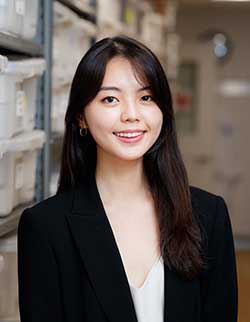
Research Engineer
Department of Biomechanics
AMT Center
510 East 73rd Street, Room 202
New York, NY 10021
Tel: 646.797.8299
Email: leeha@hss.edu
About Haena-Young Lee
Haena joined the Department of Biomechanics as a Research Engineer in April 2021. Her main areas of research include both computational and cadaveric approaches to studying the mechanics of the hip. She works primarily on projects driven by the Stavros Niarchos Foundation Complex Joint Reconstruction Center.
One of her current projects is developing a finite element approach to examine the biomechanics of a patient-specific hip implant for large acetabular bone defects. The computational results are compared with known clinical findings to gain insights into the biomechanical behavior and failure mechanisms of bone-implant systems. Haena is also working on a series of femoral cadaveric experiments investigating the stability of titanium tapered spline stems in a periprosthetic fracture model reduced with prophylactic cables. These studies compare contact lengths, number of cables, and types of cables to propose biomechanically driven guidelines for treating periprosthetic fractures in revision total hip arthroplasties.
Haena graduated from Cornell University in 2020 with a Bachelor of Science and Master of Engineering in Mechanical Engineering. During her masters, she implemented a time series analysis with a simple neural network to develop a framework for predicting thrombosis in patients with ventricular assist devices. Outside of work, Haena loves to read, play video games, and explore the city with her partner and very cute cat, Leia.
Education
Cornell University, Master of Engineering in Mechanical Engineering
Cornell University, Bachelor of Science in Mechanical Engineering
Sean Letendre, BS
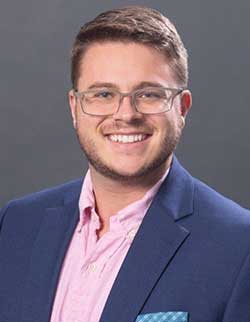
Research Engineer
Department of Biomechanics
AMT Center
510 East 73rd Street, Room 202-A
New York, NY 10021
Tel: 212.774.7152
Email: letendres@hss.edu
About Sean Letendre
Sean is a research engineer who recently started his career in biomechanics. He is currently studying the risk factors in the knee that affect the joint’s contact mechanics after a partial meniscectomy. Some of his roles include assisting with imaging of patient and cadaveric knee specimens through MRI, designing and manufacturing fixtures used to aid in various experiments and developing Finite Element Models of the soft tissue in each knee. This data is used to observe the effects of partial meniscectomies on the articular cartilage of knees with different geometry and material properties.
Sean received his undergraduate degree in Mechanical Engineering at Bucknell University in Lewisburg, Pennsylvania. While at Bucknell, he studied chaotic vibration and modal analysis. He also worked on a design team with Geisinger Hospital for a device that would assist surgeons during a femoral osteotomy, which led Sean to pursue research in Biomechanics.
Kate Meyers, MS
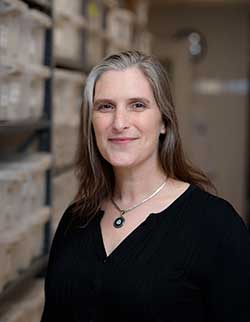
Research Engineer and Lab Manager
Department of Biomechanics
AMT Center
510 East 73rd Street, Room 202
New York, NY 10021
Tel: 212.606.1356
Email: meyersk@hss.edu
About Kate Meyers
Kate Meyers works in the dual role of Research Engineer and Lab Manager. She joined HSS after receiving her BS and MS in Biomechanical Engineering from Syracuse University.
She collaborates with clinicians, residents, and fellows across all surgical services to bolster their biomechanics acumen while furthering their research interests. Kate’s expertise is in experimental design with recent research focused on spine and hip kinematics, hip arthroplasty, and wrist and elbow stability.
As the Lab Manager, she explores new technologies to further the capabilities of the research group, trains engineers and students on both equipment and experimental methods, directs core mechanical testing needs for the department, and acts as a primary contact for surgeon-driven research.
Kate has been a member of the Orthopedic Research Society since 2006 and reviews for various journals including Journal of Orthopaedic Surgery and Research.
Selected Publications
- Meyers KN, Middleton KK, Fu MC, Dines JS. Comparison of a Novel Anatomic Technique and the Docking Technique for Medial Ulnar Collateral Ligament Reconstruction. Am J Sports Med. 2022 Mar;50(4):1061-1065. [PMID:35188812]
- Quevedo González FJ, Meyers KN, Schraut N, Mehrotra KG, Lipman JD, Wright TM, Ast MP. Do Metaphyseal Cones and Stems Provide Any Biomechanical Advantage for Moderate Contained Tibial Defects in Revision TKA? A Finite-Element Analysis Based on a Cadaver Model. Clin Orthop Relat Res. 2021 Nov 1;479(11):2534-2546. [PMID: 34351312]
- Burnier M, Jethanandani R, Pérez A, Meyers K, Lee S, Wolfe SW. Comparative Analysis of 3 Techniques of Scapholunate Reconstruction for Dorsal Intercalated Segment Instability. J Hand Surg Am. 2021 Nov;46(11):980-988 [PMID: 34332817]
- Virk S, Meyers KN, Lafage V, Maher SA, Chen T. Analysis of the influence of species, intervertebral disc height and Pfirrmann classification on failure load of an injured disc using a novel disc herniation model. Spine J. 2021 Apr;21(4):698-707. [PMID: 33157322]
For more publications, please see the PubMed listing.
Elexis (Baral) Padgett, MS
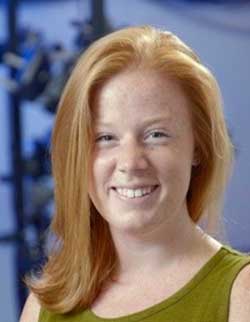
Research Engineer III
Department of Biomechanics
AMT Center
510 East 73rd Street, Room 202-A
New York, NY 10021
Tel: 646.797.8904
Email: barale@hss.edu
About Elexis (Baral) Padgett
Elexis joined the department in September of 2013 as the lab technician. Since then, she has moved up the ladder to a Research Engineer III and directly manages the entire implant retrieval system as well as many of the projects which stem from this field of research. Her main areas of focus are implant failure analysis, material degradation, and translational aspects of implant design that may impact patient outcomes or correlate with patient demographics.
While at HSS, the hospital funded her further education for her Masters Degree which she completed in 2022 at City College of New York in their Biomedical Engineering department. Her thesis was a mouse model focused on bone healing post total knee arthroplasty for patients who suffer from Glucocorticoid Induced Osteoarthritis (GIOP). She has always been interested in Orthopaedics since her undergraduate education at Rensselaer Polytechnic Institute. While at HSS, Elexis has helped raise awareness in the STEM field by helping programs like the Perry Initiative which introduce female high school students to careers in orthopaedics. Elexis is a member of the Orthopaedic Research Society (ORS), International Society for Technology in Arthroplasty (ISTA) and the American Academy of Orthopaedic Surgeons (AAOS).
Research
- Implant Failure Analysis
- Implant Longevity
- Material Science
- Bone Healing and Adaptation
Selected Publications
Kahlenberg, Cynthia, et al. "Clinical and Biomechanical Characteristics of Posterior-Stabilized Polyethylene Post Fractures in Total Knee Arthroplasty: A Retrieval Analysis." The Journal of Arthroplasty (2023).
Chen, James B., et al. "A Postmortem Analysis of Polyethylene Damage and Periprosthetic Tissue in Rotating Platform and Fixed Bearing Tibial Inserts." The Journal of Arthroplasty 37.6 (2022): 1203-1209.
Kahlenberg, Cynthia A., et al. "Retrieval analysis of polyethylene components in rotating Hinge knee arthroplasty implants." The Journal of Arthroplasty 36.8 (2021): 2998-3003.
Baral, Elexis C., et al. "Porous coatings in retrieved acetabular components." The Journal of Arthroplasty 35.8 (2020): 2254-2258.
For more publications, please see the PubMed listing.
David Shamritsky, MEng
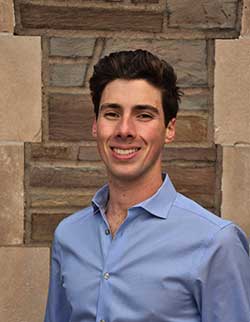
Research Engineer
Department of Biomechanics
AMT Center
510 East 73rd Street, Room 202-A
New York, NY 10021
Tel: 212-774-7247
Email: shamritskyd@hss.edu
About David Shamritsky
David’s work in the Biomechanics Department focuses on a clinical research device that measures structural stability of a patient’s knee in response to specific directions of loading. Outputs from this device are being used to aid in diagnosis of soft tissue injuries, evaluate the effectiveness of surgical treatments, and compare post-operative results to intra-operative decision-making. This project is highly collaborative with clinicians and researchers in the Sports Medicine Institute and Adult Reconstruction & Joint Replacement (ARJR) services.
Prior to joining HSS, David received his undergraduate and master’s degrees in Biomedical Engineering from Cornell University. At Cornell, he performed research in Dr. Christopher Hernandez’s lab developing an in-vivo fatigue loading model for the knee to study bone marrow lesions and osteoarthritis. His graduate design project was in partnership with ENT clinicians at Weill Cornell Medicine and in Zimbabwe to design and prototype a medical device that met the needs of their country’s hospital network.
Education
Cornell University, B.S. 2021
Cornell University, M. Eng. 2021
Sara Sacher, MS
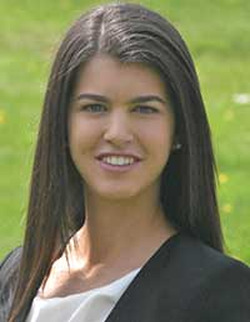
Research Engineer
Department of Biomechanics
AMT Center
510 East 73rd Street, Room 202-A
New York, NY 10021
About Sara Sacher
Sara Sacher joined the Biomechanics Department at HSS in 2023. She is currently managing the implant retrieval system and overseeing subsequent research projects. Research focus areas include mechanical characterization of implant materials, failure analysis, and clinical implications of such findings.
Prior to this role, Sara was a research engineer in the MRI Lab in the department of Radiology at HSS. In the MRI lab, the focus of Sara’s research was the development of novel quantitative imaging techniques to evaluate tissue pathology after total joint arthroplasty. Prior to joining HSS, Sara earned her B.S. and M.S. degrees in materials science and engineering from Virginia Tech and Cornell University, respectively. At Cornell, Sara worked under the guidance of Dr. Eve Donnelly, where she investigated the mechanisms behind skeletal fragility in patients with type II diabetes. At Virginia Tech, Sara worked in an additive manufacturing research lab evaluating the effects of thermal and morphological characteristics on material printability.
Education
Virginia Tech, B.S. in Materials Science and Engineering, 2019
Cornell University, M.S. in Materials Science and Engineering, 2021
Awards
HSS 1st Annual Research Day Presentation Award, 2023
Kappa Delta / American Academy of Orthopaedic Surgeons Travel Award, 2020
Selected Publications
Sacher SE, Koff MF, Tan ET, Burge A, Potter HG. The role of advanced metal artifact reduction MRI in the diagnosis of periprosthetic joint infection. Skeletal Radiol. 2023 Oct 24. doi: 10.1007/s00256-023-04483-5. PMID: 37875571.
Sacher SE, Neri JP, Gao MA, Argentieri EC, Potter HG, Koch KM, Koff MF. MAVRIC based T2 mapping assessment of infrapatellar fat pad scarring in patients with total knee arthroplasty. J Orthop Res. 2023 Jun;41(6):1299-1309. doi: 10.1002/jor.25472. Epub 2022 Nov 6. PMID: 36262013; PMCID: PMC10113607.
Sacher SE, Hunt HB, Lekkala S, Lopez KA, Potts J, Heilbronner AK, Stein EM, Hernandez CJ, Donnelly E. Distributions of Microdamage Are Altered Between Trabecular Rods and Plates in Cancellous Bone From Men With Type 2 Diabetes Mellitus. J Bone Miner Res. 2022 Apr;37(4):740-752. doi: 10.1002/jbmr.4509. Epub 2022 Feb 15. PMID: 35064941; PMCID: PMC9833494.
For more publications, please see the Pubmed Listing
Clarisse Zigan, MS
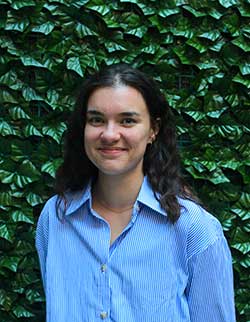
Post Bac Researcher
Department of Biomechanics
AMT Center
510 East 73rd Street, Room 202-A
New York, NY 10021
Email: ziganc@hss.edu
About Clarisse Zigan
Clarisse Zigan joined the Biomechanics Department at HSS in 2023 as a Post Bac Researcher after completing her undergraduate and master’s degrees in Biomedical Engineering from Purdue University. While at Purdue, she enhanced her practical experience in research by leading projects in Dr. Deva Chan’s Lab where she developed bioreactors for in vitro studies of chondrocyte mechanobiology and mechanotransduction in hydrogels and designed an intra-articular ankle fracture device for large animal studies of post traumatic osteoarthritis.
She is interested in the interplay between tissue specific mechanics as well as whole joint biomechanics in order to contribute to the knowledge gaps needed for implant improvement. Her current research revolves around experimental and robotic work, focused on quantifying the contributions of soft tissues surrounding the hip capsule to determine their influence to the resistance of impingement and dislocation in total hip arthroplasties.
Education
Purdue University, B.S. 2022
Purdue University, M.S. 2023
Awards
Master’s Student Paper Competition Finalist, Summer Biomechanics, Bioengineering, & Biotransport Conference (SB3C), 2023
Device Development
Joseph Lipman, MS
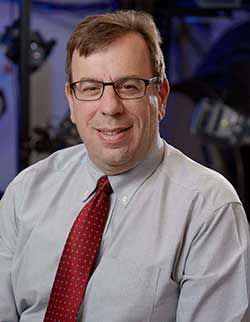
Director of Device Development, Biomechanics
Department of Biomechanics
AMT Center
510 East 73rd Street, Room 202-H
New York, NY 10021
Tel: 212.606.1420
Email: lipmanj@hss.edu
About Joseph Lipman
After receiving and undergraduate and master’s degree in mechanical engineering from Tufts University, Mr. Lipman joined the Biomechanics Department as a Design Engineer.
He has over 33 years of medical research and device development experience and has been the Director of Device Development since 2000. He has worked with multiple services at HSS including Adult Hip and Knee Replacement, Foot and Ankle, Hand and Upper Extremity, Hip Preservation, Spine and Sports Medicine. In working with these services and the Biomechanics department, he’s contributed to the development of implants for the knee, hip, elbow, wrist and spine. These implants have been licensed to several orthopaedic companies and are sold worldwide. He is a named inventor on twenty-six US patents and has multiple publications in the medical device area. In addition, he is a registered US Patent Agent.
He is the recipient of the 2019 AAOS Orthopaedic Video Theater Award – Adult Reconstruction Hip, the 2011 AOSSM Excellence in Research Award and the 1998 ASB Clinical Biomechanics Award. He is a reviewer for JOR, CORR, JBJS, Scientific Reports and the HSS journal.
Ryan Helbock, MS
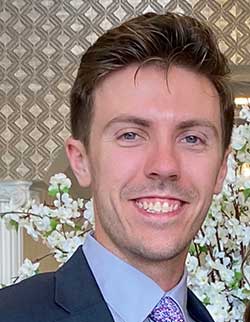
Design Engineer
Department of Biomechanics
AMT Center
510 East 73rd Street, Room 202-A
New York, NY 10021
Tel: 212.774.2228
Email: helbockr@hss.edu
About Ryan Helbock
Ryan Helbock joined HSS in 2022 as a Design Engineer in the Device Development group, where he works on patient-specific preoperative planning and custom implant design for complex joint arthroplasty. He is also involved in computational research studying how implant design and bone quality can contribute to early failure of total hip replacements.
Prior to joining HSS, Ryan received his BE and MS degrees in Biomedical Engineering at Stony Brook University in 2020 and 2022, respectively. During his graduate studies, he conducted research on cardiovascular implants and designed a novel transcatheter aortic valve replacement via patient-specific computational modeling. His interest in solving complex problems involving the human body is what drew him to the multifaceted and bustling Biomechanics Department at HSS
Education
2022, Master of Science in biomedical engineering, Stony Brook University
2020, Bachelor of Engineering in biomedical engineering, Stony Brook University
Selected Publications
- Helbock RT, Anam SB, Kovarovic BJ, Slepian MJ, Hamdan A, Haj-Ali R, Bluestein D. Designing a Novel Asymmetric Transcatheter Aortic Valve for Stenotic Bicuspid Aortic Valves Using Patient-Specific Computational Modeling. Ann Biomed Eng. 2023 Jan;51(1):58-70. doi: 10.1007/s10439-022-03039-3. Epub 2022 Aug 30. PMID: 36042099.
- Kovarovic B, Helbock R, Baylous K, Rotman OM, Slepian MJ, Bluestein D. Visions of TAVR Future: Development and Optimization of a Second Generation Novel Polymeric TAVR. J Biomech Eng. 2022 Jun 1;144(6):061008. doi: 10.1115/1.4054149. PMID: 35318480; PMCID: PMC8990719.
For more publications, please see the PubMed listing.
Ritvik Sarkar, MEng
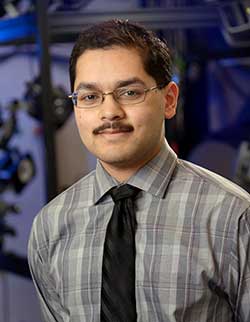
Design Engineer
Department of Biomechanics
AMT Center
510 East 73rd Street, Room 202
New York, NY 10021
Tel: 646.714.6749
Email: SarkarR@hss.edu
About Ritvik Sarkar
Ritvik Sarkar studied in Cornell University with an interest in medical device design. While working in Christopher Hernandez’s lab to design a platform to test the mechanical properties of bacterial cell walls, Ritvik became interested in the lab’s other work in orthopedics. After graduating from Cornell in 2017 with a B.S. and M.Eng. in Mechanical Engineering, he joined the Device Development group within Hospital for Special Surgery’s Department of Biomechanics.
Ritvik works closely with both HSS surgeons and orthopedic implant manufacturers to design patient specific implants for complex primary and revision hip and knee replacements. He also designs and develops new implant systems that address challenging clinical problems in the hip and upper extremity.
Education
Masters of Engineering in mechanical engineering, Cornell University, 2017
Bachelors of Science in mechanical engineering, Cornell University, 2016
Yupin Shi, MS
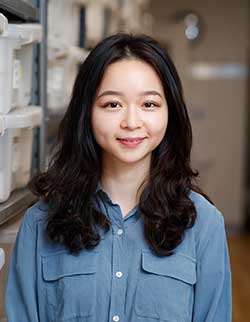
Design Engineer
Department of Biomechanics
AMT Center
510 East 73rd Street, Room 202-H
New York, NY 10021
Tel: 212.774.7652
Email: shiy@hss.edu
About Yupin Shi
Yupin Shi joined Hospital for Special Surgery (HSS) Department of Biomechanics in August 2021 as a design engineer in the device development group. Her work focuses on patient implant design including total hip, knee, and elbow replacement. She also uses finite element methods (FEM) to study implants and bone-implant interactions. In addition, she helps with the development of implant systems that will be licensed to orthopaedic companies.
Yupin was born and raised in China. She received her B.S. degree from Lehigh University in Pennsylvania and M.S. degree from Johns Hopkins University (JHU) in Maryland both in Mechanical Engineering. At Lehigh, she was a research assistant in Dr. Natasha Vermaak’s lab where she simulated wear motion and thermal effect on different bi-material composites with FEM. During her study at JHU, she joined Dr. Vicky Nguyen’s lab and numerically simulated the locomotion of a thermo-reactive bilayer soft gel robot with non-linear FEM. In the last semester of her graduate study, she worked as a R&D Mechanical Engineering intern at Relavo, a JHU student startup medical device company that is developing a disinfection device for home peritoneal dialysis treatment.
Yupin wants to use her expertise in implant design and biomechanics to contribute to the healthcare industry.
Education
2019, Bachelor of Science, Mechanical Engineering, Lehigh University.
2021, Master of Science, Mechanical Engineering, Johns Hopkins University.
Selected Publications
- Pantula A, Datta B, Shi Y, Wang M, Liu J, Deng S, Cowan NJ, Nguyen TD, Gracias DH. Untethered unidirectionally crawling gels driven by asymmetry in contact forces. Science Robotics. 2022 Dec 14;7(73):eadd2903.
- Grejtak T, Jia X, Feppon F, Joynson SG, Cunniffe AR, Shi Y, Kauffman DP, Vermaak N, Krick BA. Topology Optimization of Composite Materials for Wear: A Route to Multifunctional Materials for Sliding Interfaces. Advanced Engineering Materials. 2019 Aug 1;21(8).
- Grejtak T, Jia X, Cunniffe AR, Shi Y, Babuska TF, Pack RC, Vermaak N, Compton BG, Krick BA. Whisker orientation controls wear of 3D-printed epoxy nanocomposites. Additive Manufacturing. 2020 Dec 1;36:101515.
Our Collaborators
- Orthopedic Soft Tissue Research Program
- Leon Root Motion Analysis Laboratory
- Radiology and Imaging, MRI Lab
- Cornell University, CAMEO
